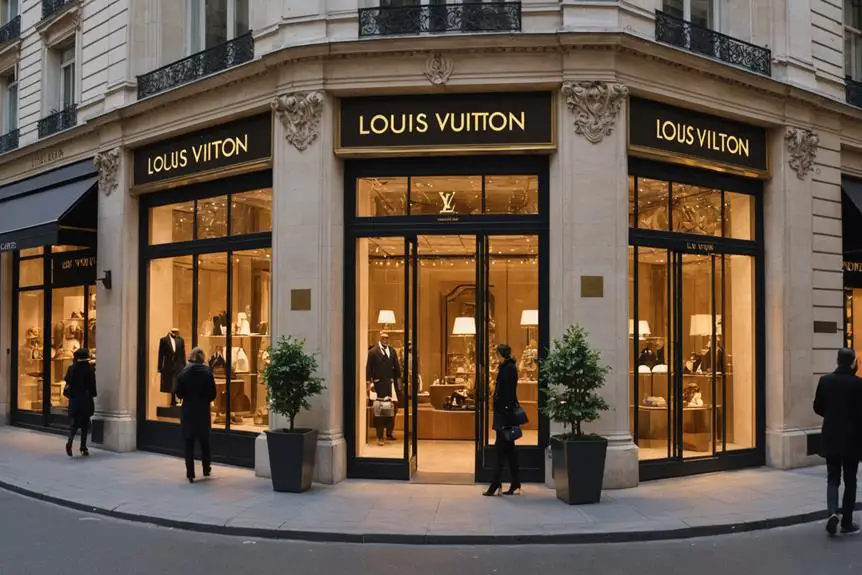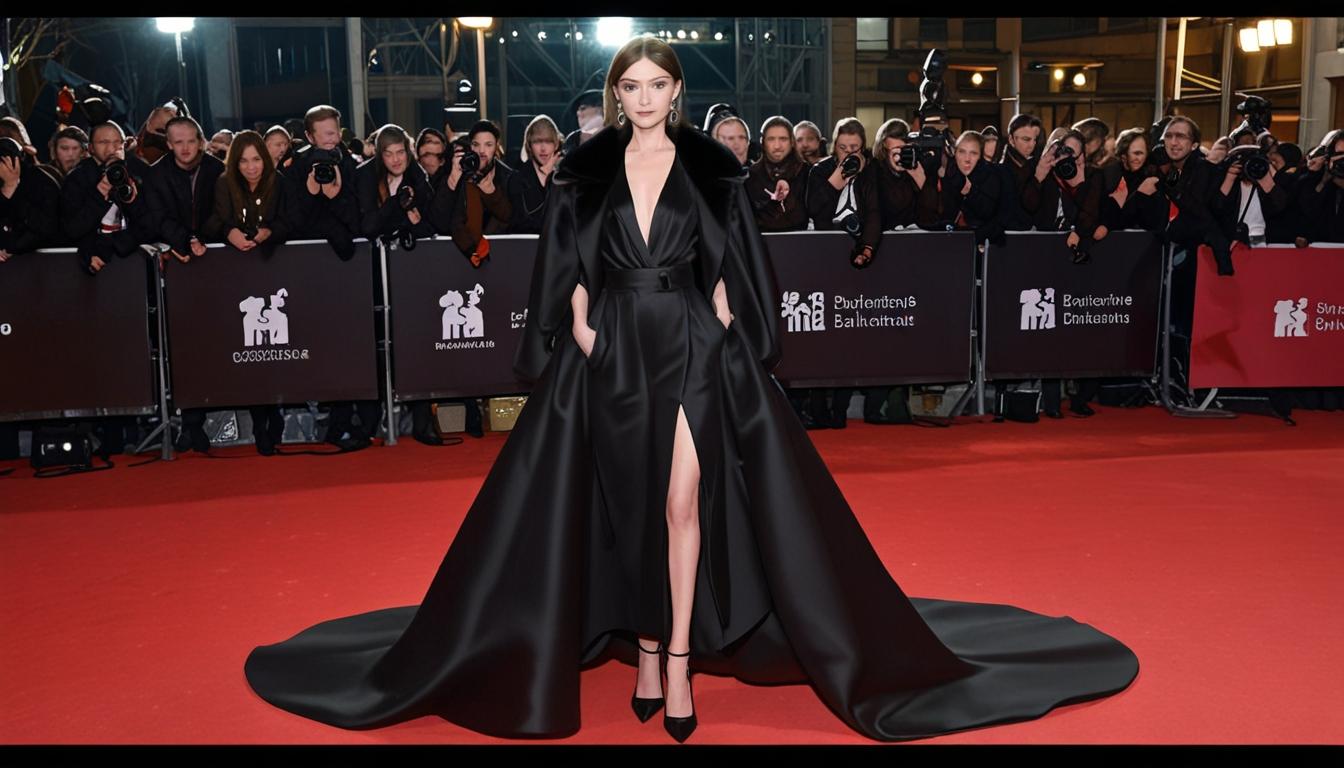You might be surprised to learn that Louis Vuitton is owned by LVMH Moët Hennessy Louis Vuitton, a global leader in luxury goods. This conglomerate, formed in 1987, has become synonymous with high-end brands, with Louis Vuitton as its crown jewel. Under the strategic direction of Bernard Arnault, LVMH constantly evolves to stay ahead in the competitive luxury market. But what does this ownership structure mean for the brand's identity and future? As we explore, you'll find some intriguing implications that could reshape your understanding of luxury fashion.
Overview of LVMH
LVMH Moët Hennessy Louis Vuitton stands as the world's largest luxury goods conglomerate, and it's a powerhouse in the fashion industry. You've probably seen their iconic brands everywhere, especially Louis Vuitton. Formed in 1987 through the merger of Louis Vuitton and Moët Hennessy, LVMH is headquartered in Paris, France, where all the magic happens. With over 75 prestigious brands across six divisions, the fashion and leather goods segment is the biggest player in the game.
In 2022, LVMH reported revenues of approximately €79 billion, which is about $86.1 billion! That's a staggering amount, showing just how significant they are in the luxury market. Can you imagine being part of such a successful empire? Bernard Arnault, the Chairman and CEO since 1989, has led the company through incredible expansions and acquisitions, including the legendary Louis Vuitton. His vision has driven LVMH to dominate the luxury goods scene.
What's even cooler is that LVMH is listed on Euronext Paris and is part of the CAC 40 index, which really highlights its importance in the European stock market. So, the next time you admire a Louis Vuitton bag or a fancy bottle of Moët, remember you're looking at the work of a company that's not just about luxury, but also about innovation and success. Isn't it inspiring to see how a few brands can create such a massive impact?
Corporate Structure
Let's take a closer look at how LVMH is set up and who's running the show. You've got Bernard Arnault at the helm, steering this massive luxury ship since 1989, and under him, the organization is a well-oiled machine. With Louis Vuitton making up a huge chunk of their profits, it's clear that the leadership knows how to keep things stylish and profitable!
LVMH's Organizational Framework
The organizational framework of LVMH is a well-structured system designed to manage a diverse portfolio of luxury brands effectively. You'll find that LVMH, the parent company of Louis Vuitton, operates through six main divisions: Fashion Group, Wines and Spirits, Perfumes and Cosmetics, Watches and Jewelry, Selective Distribution, and Other Activities. This means they cover a lot of ground, right?
With around 60 subsidiaries, they manage an impressive portfolio of 75 luxury brands, including big names like Louis Vuitton, Dior, and Fendi. Talk about luxury! Bernard Arnault, the CEO since 1989, plays a vital role in overseeing this entire operation. Under his leadership, LVMH has expanded tremendously in the luxury market, capturing the hearts of many.
Employing over 83,000 people globally, about 30% of whom are in France, LVMH thrives on teamwork and collaboration. Each subsidiary contributes to the overall success of the organization, ensuring that the high standards expected of luxury brands are met. So, next time you see a Louis Vuitton bag, remember there's a whole framework working behind the scenes to make it happen! Isn't that fascinating?
Key Leadership Figures
At the helm of LVMH's corporate structure is Bernard Arnault, who has been steering the ship as Chairman and CEO since January 1989. Talk about an impressive run! Under Arnault's leadership, LVMH has grown into a powerhouse for luxury brands, including the iconic Louis Vuitton.
In 2024, Stéphan Bianchi jumped on board as LVMH Group Managing Director. He's now in charge of strategic management and oversees Regional Presidents, making sure everything runs smoothly. With around 60 subsidiaries managing 75 luxury brands across different sectors like Fashion, Wines and Spirits, and Perfumes and Cosmetics, the corporate structure is quite extensive.
Did you know LVMH employs over 83,000 people globally? That's a whole lot of talent dedicated to keeping these luxury brands at the top of their game! And with LVMH listed on Euronext Paris, it's clear they've got a significant presence in the European stock market. So, whether you're sipping a fine wine or flaunting a designer handbag, you've got Arnault and his team to thank for it! Isn't that incredible?
Brand Portfolio
When you think about Louis Vuitton, it's hard to ignore the amazing lineup of luxury brands under the LVMH umbrella. Each brand, from Dior to Fendi, has its own unique history and cultural impact, much like how Gucci's evolution has shaped the luxury market. Isn't it fascinating how these notable acquisitions have shaped the very essence of luxury as we understand it?
Luxury Brand Overview
Louis Vuitton stands as a cornerstone in the luxury brand portfolio of LVMH (Moët Hennessy Louis Vuitton), a powerhouse that boasts about 75 prestigious brands across diverse sectors. This luxury goods company isn't just any brand; it's the flagship brand that leads the way. Founded in 1854, Louis Vuitton is especially famous for its stunning leather goods, like the iconic monogram canvas products you see everywhere.
LVMH's fashion and leather division, which includes Louis Vuitton, accounts for roughly 50% of its total revenues. That's a huge chunk, right? Here are a few key highlights about this exciting brand:
- LVMH's Revenues: As of 2023, they reported a whopping €86.2 billion ($92.5 billion).
- Innovative Offerings: Louis Vuitton consistently rolls out fresh and stylish products.
- Arnault's Vision: The leadership under Bernard Arnault has driven its success.
- Strategic Acquisitions: LVMH has smartly invested in Louis Vuitton, making it even stronger.
Notable Acquisitions History
Historically, LVMH has made strategic acquisitions that greatly enhance its brand portfolio, with Louis Vuitton playing a pivotal role in this growth. Can you believe it all started in 1854? Fast forward to 1987, when Louis Vuitton merged with Moët Hennessy, setting the stage for an exciting journey. Since then, LVMH has gobbled up some fantastic brands!
You've got Givenchy in 1988, Berluti in 1993, and Fendi in 2000, all adding to the luxury vibe. But wait, there's more! In 2011, LVMH splurged $5.2 billion on Bulgari, and in 2021, they made headlines with Tiffany & Co. for a whopping $15.8 billion—talk about luxury!
And let's not forget Sephora, acquired in 1997, which now boasts over 3,000 beauty stores worldwide. With roughly 75 prestigious brands in its portfolio, LVMH thrives, with Louis Vuitton contributing around 50% of total revenues. That's huge! So, the next time you see a Louis Vuitton bag, remember—it's not just a brand; it's part of a luxury empire! How cool is that?
Financial Performance
LVMH's financial performance underscores its dominance in the luxury market, with revenues reaching an impressive €86.2 billion ($92.5 billion) in 2023. That's a big number, right? This success highlights how much people love luxury goods, especially from brands like Louis Vuitton. In fact, the fashion and leather goods division, which includes Louis Vuitton, makes up about 50% of LVMH's total revenues!
Here are some key points about LVMH's financial performance:
- In 2022, LVMH's operating profit hit €21 billion, proving that luxury brands can be super profitable.
- The company's market capitalization topped €400 billion, making it the most valuable luxury goods company in the world. Wow!
- Over the past decade, LVMH has enjoyed an average annual revenue growth of around 15%, thanks largely to Louis Vuitton's stellar performance.
- The luxury market is booming, and LVMH is riding that wave like a pro surfer!
Recent Developments
Recent developments in the luxury market reflect LVMH's strategic moves to solidify its dominance. You might have noticed that LVMH isn't just sitting back; they're on a roll, acquiring brands left and right! In November 2023, they snagged the Los Angeles-based eyewear brand Barton Perreira for a cool $80 million. This acquisition really boosts their portfolio in the luxury eyewear market. Who wouldn't want to rock some stylish specs from a top-tier brand? Additionally, the luxury market continues to thrive, with brands like Versace evolving and expanding their reach in high fashion, making their vintage pieces more sought after. identifying vintage pieces can add value to luxury collections!
But that's not all! Back in November 2022, LVMH acquired Pedemonte Group, a jewelry maker from Piedmont. This move strengthens their position in the luxury jewelry sector, which is a big deal if you love bling. Plus, they've partnered with Stella McCartney to enhance sustainable fashion initiatives, showing that luxury can be environmentally friendly. Isn't that fantastic?
Looking ahead, LVMH plans to integrate craftsmanship by acquiring Swiss manufacturer L'Epée 1839 in June 2024. This will bolster their watches division and guarantee that every timepiece is a work of art.
These recent developments illustrate LVMH's commitment to staying at the forefront of luxury goods. They're not just about flashy logos; they're creating a legacy of quality and sustainability. So, whether you're shopping for designer eyewear or the perfect piece of jewelry, LVMH is making certain you have some amazing options! Are you excited to see what they do next?
Leadership and Challenges
As LVMH continues to expand its influence in the luxury market, leadership plays an essential role in steering the company through both opportunities and challenges. With Bernard Arnault at the helm since 1989, LVMH has thrived despite various hurdles. Recently, Stéphan Bianchi stepped in as the Group Managing Director, bringing fresh perspectives to the strategic management of brands like Louis Vuitton and Tiffany & Co.
Maneuvering the luxury market isn't all smooth sailing, though. LVMH has faced its share of market challenges, like the temporary store closures in Russia due to geopolitical tensions. But they've shown resilience, reporting a whopping €86.2 billion ($92.5 billion) in revenue for 2023! That's impressive, right?
Here are some key challenges and strategies LVMH is tackling:
- Geopolitical Issues: Maneuvering store closures and market instability.
- Financial Complexities: Balancing pandemic dividends, like the $140 million paid by Tiffany & Co., with overall profitability.
- Market Adaptation: Adjusting to changing consumer behaviors post-pandemic.
- Sustainability Initiatives: Committing to eco-friendly practices to meet modern consumer expectations.
Leading a luxury empire isn't just about profits; it's about adapting to a dynamic landscape. With visionary leaders like Arnault and Bianchi, LVMH is well-equipped to tackle whatever comes next. So, what do you think? Could you lead a giant like LVMH through these tricky waters?
Frequently Asked Questions
Who Is the Real Owner of Louis Vuitton?
You'll discover that the real owner of Louis Vuitton is shaped by luxury branding and fashion history. Its identity thrives on market competition, corporate acquisitions, designer collaborations, and retail strategies, ensuring global expansion while preserving its rich heritage.
Does the Vuitton Family Still Own Louis Vuitton?
The Vuitton family doesn't own the brand anymore. Their legacy influences luxury brand evolution, but LVMH now drives fashion industry dynamics. Historical ownership changes shaped brand valuation insights and consumer perception, reinforcing family influence on branding.
Is Gucci Owned by LV?
No, Gucci isn't owned by LVMH; it's under Kering's umbrella. This iconic brand thrives amid fierce luxury competitors, showcasing designer history through fashion collaborations and celebrity endorsements, while evolving with market trends and sustainability in retail strategies.
What Does the Arnault Family Own?
The Arnault family owns a vast luxury empire, including renowned brands and a strong foothold in wealth management. Their corporate strategy emphasizes global expansion, enhancing brand heritage, and solidifying market influence while preserving their family legacy in fashion.




